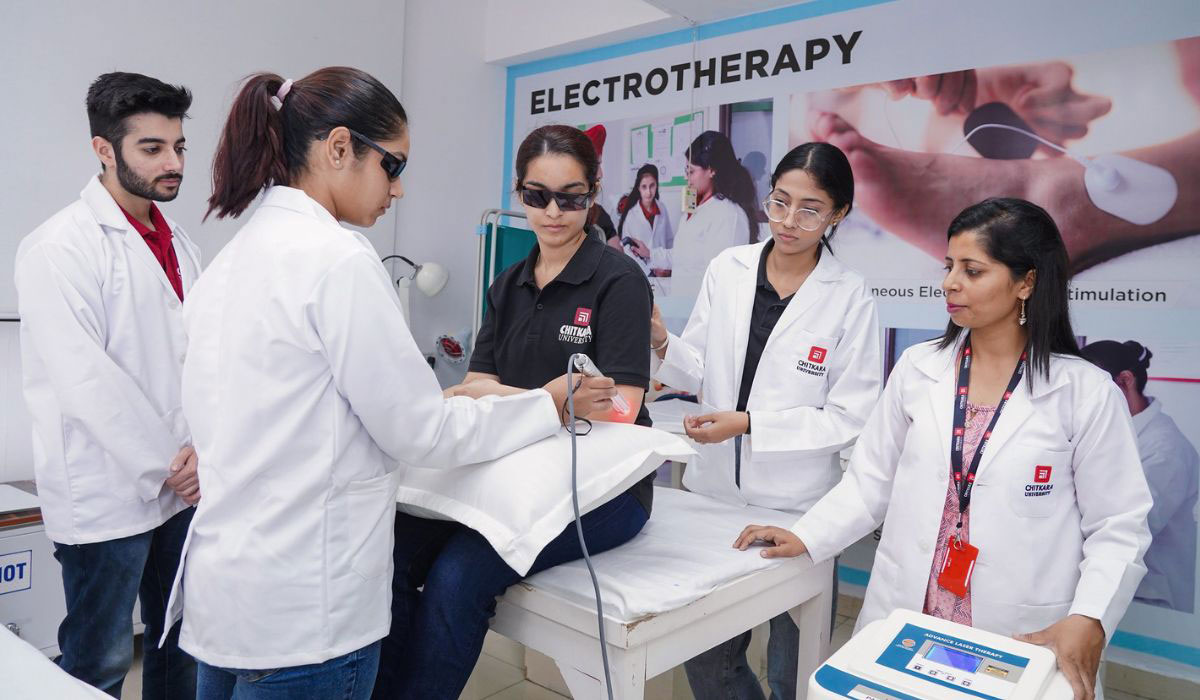The lives of people with injuries, disabilities, or other physical ailments can be significantly improved by physiotherapy, a medical speciality that focuses on maximising physical function and mobility. The field of physiotherapy offers a wide variety of employment options, rewarding responsibilities, and competitive pay.
Let’s examine the range of physiotherapy, the educational requirements, employment possibilities, job duties, and potential pay for this fulfilling vocation.
Physiotherapy Degree and Program
To start a career in this industry, aspirant professionals must hold a Bachelor’s or Master’s degree in physiotherapy from an accredited university. Students who complete these courses will have the in-depth theoretical understanding and practical experience required to become licenced physiotherapists.
Physiotherapy Scope
The scope post completion of Physiotherapy is quite promising, offering a range of opportunities for skilled professionals in various sectors of the healthcare industry. A few venues where physiotherapists can find employment include hospitals, rehabilitation clinics, private practises, sports organisations, community health centres, and educational institutions. They can also choose from a wide range of specialisations, such as cardiac, orthopaedic, neurology, sports medicine, geriatrics, and more.
Also, read this blog post: Changing Lifestyles and the Scope of Physiotherapy
Physiotherapy Job Opportunities
A physiotherapy degree opens up a plethora of career options for professionals. Some of the most common physiotherapy jobs include:
- Clinical Physiotherapist: Working in hospitals or private clinics, clinical physiotherapists diagnose and treat patients with various musculoskeletal and neurological conditions, creating tailored rehabilitation programs to improve their mobility and overall physical function.
- Sports Physiotherapist: Specializing in sports medicine, these professionals work with athletes to prevent injuries, provide immediate care during sporting events, and design rehabilitation plans to aid in their recovery.
- Pediatric Physiotherapist: Focused on children’s health, pediatric physiotherapists provide interventions to address developmental delays, disabilities, and injuries in infants and young children.
- Geriatric Physiotherapist: Working with elderly individuals, geriatric physiotherapists address age-related physical challenges, enhance mobility, and improve overall quality of life.
Physiotherapists can find employment prospects in specialised domains such women’s health, occupational health, oncology, and respiratory care in addition to the positions already mentioned. Physiotherapists who specialise in women’s health work with pregnant and postpartum women to treat musculoskeletal problems and advance general well-being. Oncology physiotherapists assist patients receiving cancer treatments to manage pain and retain mobility, while occupational health physiotherapists concentrate on job ergonomics and injury prevention. Physiotherapists that specialise in respiratory treatment treat patients with breathing problems and respiratory conditions.
Technology developments have also increased the number of jobs available for physiotherapists in telehealth and virtual care environments. Professionals can engage with patients remotely using telephysiotherapy, providing consultations, exercise plans, and tracking progress online. This flexible approach to healthcare has grown in popularity and presents physiotherapists with a cutting-edge way to grow their practise.
Physiotherapy Roles & Responsibilities
Physiotherapists play a pivotal role in the healthcare system, and their responsibilities may include:
- Conducting patient assessments to identify physical limitations and impairments.
- Developing personalized treatment plans and goals for patients.
- Implementing therapeutic exercises, manual techniques, and other interventions.
- Monitoring progress and modifying treatment as needed for optimal results.
- Educating patients on injury prevention and self-management techniques.
- Collaborating with other healthcare professionals for holistic patient care.
Physiotherapy Salary
The salary of a physiotherapist varies widely depending on multiple factors, including geographical location, level of experience, education, specialization, and the type of employer. Generally, physiotherapists with more experience and advanced certifications tend to earn higher salaries.
The most recent statistics show that the typical physiotherapist salary in India for entry-level positions ranges from INR 3,50,000 to INR 6,00,000 annually. The income might increase to between INR 6,00,000 and INR 8,00,000 per year after a few years of expertise. In metropolitan areas or at famous universities, physiotherapists may command salaries of up to INR 10,00,000 or more annually.
Also, read this blog post: Path To Become A Successful Physiotherapist
In some cases, physiotherapists who establish their private practice can have the potential to earn even higher incomes, depending on the size of their clientele and the success of their business.
It is essential to note that beyond the monetary benefits, a career in physiotherapy brings immense job satisfaction as professionals witness the positive impact of their efforts on patients’ lives
A gratifying and exciting career choice, the profession of physiotherapy offers a wide variety of job prospects and specialisations. Physiotherapists are essential in helping patients regain physical function, promote well-being, and enhance their quality of life, whether they work in hospitals, sports organisations, rehabilitation facilities, or private clinics.
As the healthcare industry continues to change, physiotherapists are adapting to new technologies and looking at cutting-edge ways of service, such telephysiotherapy. Physiotherapy is still a viable career for those who have a passion for helping people reach their ideal level of physical health and mobility. It offers competitive pay as well as the possibility of promotion and specialisation. Aspiring physiotherapists can look forward to a fulfilling career with a variety of opportunities and a positive impact on many people’s lives.
Chitkara University is dedicated to providing students with an enriching and supportive environment to excel in their Physiotherapy courses and programs. The university ensures that its Physiotherapy programs are accredited, maintaining high standards of education and enabling students to become qualified and registered professionals. Chitkara University provides students with both academic knowledge and practical skills through a team of skilled and experienced faculty members. The university has state-of-the-art labs, rehabilitation facilities, and simulation units that enable students to obtain practical experience and hone their skills in a supervised setting. Given its enormous value in preparing students for professional practise, clinical exposure allows them to work with actual patients while being supervised by knowledgeable practitioners. Additionally, Chitkara University provides a variety of specialisation opportunities, enabling students to concentrate on particular subfields of the physiotherapy profession that interest them.
Recognizing the importance of research and innovation, the university encourages students to engage in research activities, fostering a culture of inquiry and critical thinking.
Collaborations with leading healthcare institutions and hospitals provide students with exposure to diverse clinical settings and invaluable learning experiences. Additionally, the university’s placement cell actively assists students in securing internships and job opportunities, while workshops and training sessions enhance their employability skills.
Chitkara University’s commitment to continuing education and lifelong learning is evident through its provision of various workshops, seminars, and programs for practicing physiotherapists, allowing them to stay updated with the latest advancements in the field.






